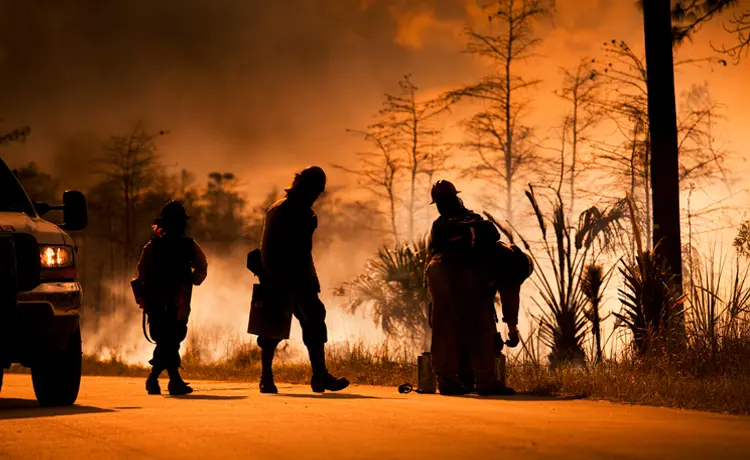The wildland fire community – firefighters, emergency medical service (EMS) and law enforcement personnel – encounters challenging obstacles in their line of duty, so much so that they may experience traumatic stress. Ensure your wildland fire community members know that while stress is part of the job, there are healthy ways to handle it – and that seeking help is a sign of bravery.
Some members of the wildland fire community might be hesitant to seek help for fear of damaging their careers.
Stress is a positive force – until it’s not anymore.
Stress is a normal and necessary part of life. Very often, it is needed – stress gives you the energy and drive to perform your best. While most stress reactions are good, severe and prolonged stress can be harmful. Certain severe traumatic events cause stress that threatens both physical and mental health. Such stress can:
- Interfere with your immune system, rational thinking and emotions.
- Impair your ability to respond to further challenges.
- Leave permanent psychological scars if not managed carefully.
Dangerous symptoms of stress (e.g., complete loss of control, chest pain or difficulty breathing, high blood pressure, severe shock, depression) warrant immediate medical attention.
Proper preparation is key in reducing stress.
Putting some routine stress-reducing practices into place will help carry you through difficult times.
Before and During the Incident
- Prepare for emergencies by anticipating, planning, training and drilling.
- Get equipment in order and maintain its readiness.
- Get yourself ready: Participate in regular exercise, eat well and get adequate rest.
- Follow legitimate directions of leaders.
- Do not take personal blame for tragedies that befall others.
- Maintain a positive mental attitude.
After the Incident
- Prepare equipment and supplies for the next assignment.
- Take good care of yourself and maintain your health.
- Avoid alcohol as it worsens stress reactions.
- Avoid or limit caffeine intake (including energy drinks).
- Participate in a year-round exercise program, as it helps lower stress reactions.
- Participate in After Action Reviews (AARs) or other “lessons learned” events.
- Talk about the event with trusted friends, colleagues or management in a nonjudgmental atmosphere.
- Write about the event in a private journal.
- Practice good nutrition and hydration.
- Practice relaxation techniques, such as deep breathing, muscle relaxation, guided imagery, yoga and meditation.
- Have a life beyond your job.
Active coping strengthens resilience.
A person can conquer stress reactions with direct action. Active coping triggers resilience and enables a person to feel less helpless. People who are actively coping:
- Understand that resilience does not mean a person does not experience stress.
- Know that stress reactions to traumatic events begin as normal human responses, but may become a problem if not managed properly.
- Recognize that resilience means one is prepared to resist stress, deal with it, absorb it and get through it.
- Practice resilience or active coping long before a traumatic event by adapting to daily problems and making the best of uncomfortable situations.
- Maintain a positive mental attitude.
- Recognize when a traumatic event has occurred.
- Accept that coworkers have individual stress reactions.
- Take many personal steps (rest, nourishment, contact with family and friends, etc.) to manage stress reactions.
- Actively participate in team-based stress support programs because crisis support services help restore team cohesion and performance.
- Support one another.
- Recognize when an individual is not improving.
- Seek out helpful resources.
Some helpful resources include the National Suicide Prevention Hotline, National Fire and Aviation Critical Incident Stress Management, National Center for PTSD and Wildland Firefighter Foundation.
For more information on various stress management products to purchase for your fire community, browse the QuickSeries® library of guides, including Stress Control & Resilience for the Wildland Fire Community.
